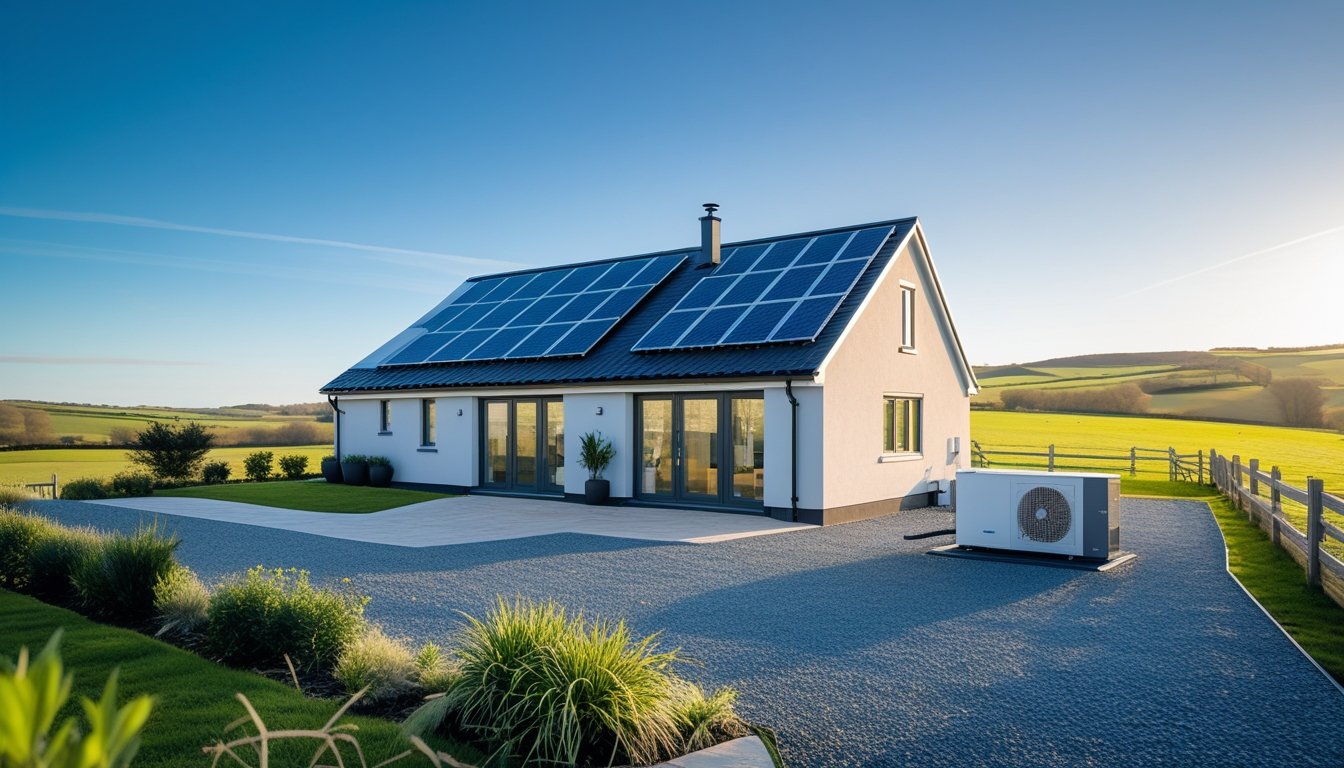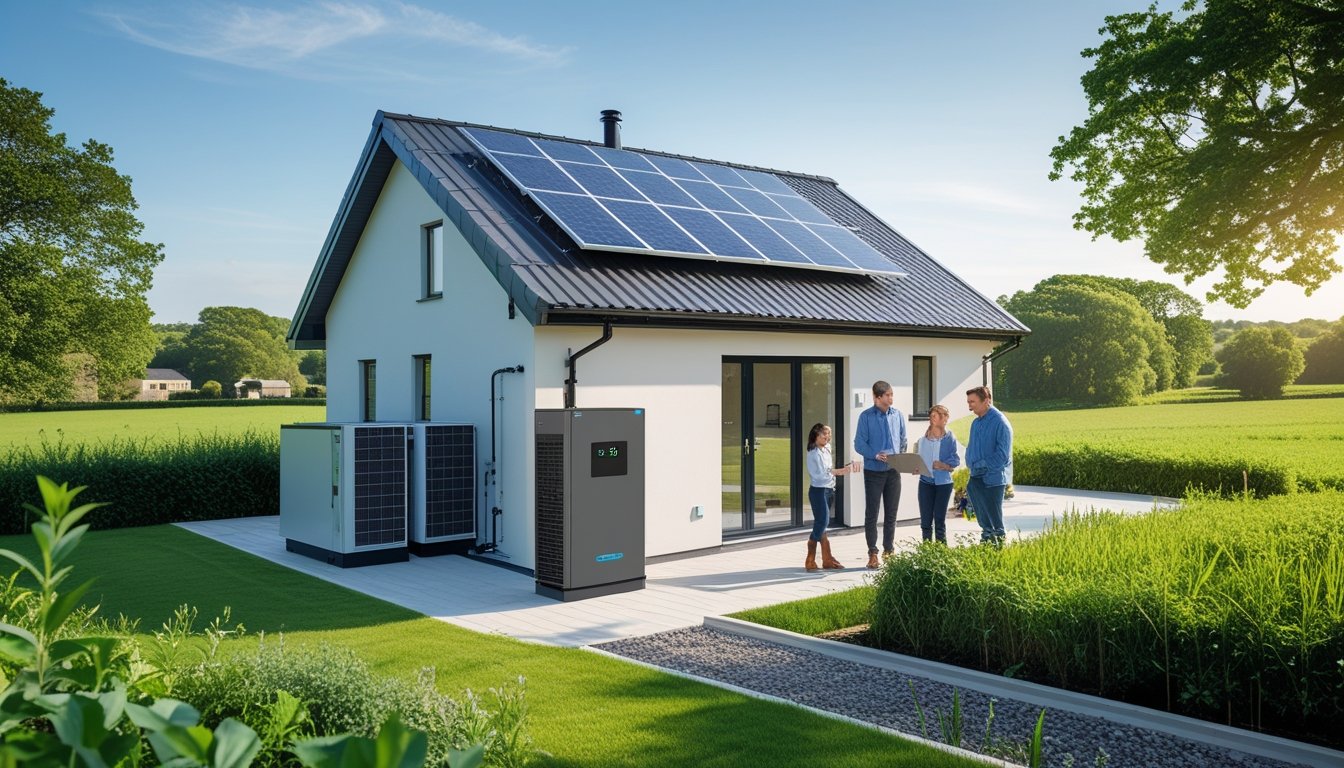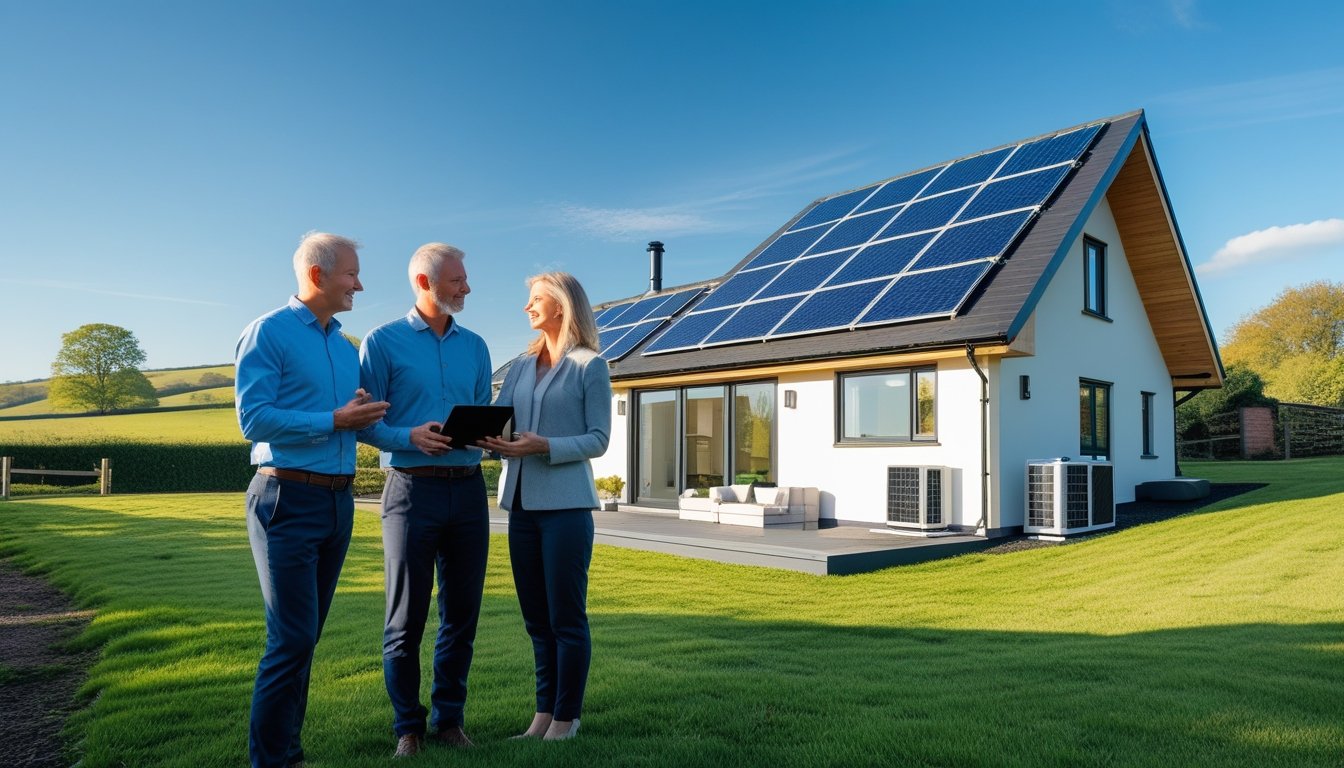Late updated: 30 Oct 2025 08:10
Written by: Oliver Bennett
Efficient Renewable Heating For Rural UK Homes: Solutions And Benefits
Navigating the heating challenges of rural UK homes is essential as we shift towards sustainable energy solutions. Harnessing renewable heating options like heat pumps and biomass energy can significantly reduce carbon emissions while ensuring homes remain warm and comfortable. The rural landscape offers unique opportunities and challenges, requiring bespoke solutions to meet energy efficiency needs.

Incorporating renewable heating isn't just about the environment; it also promises substantial cost savings for homeowners. With many rural properties off the main gas grid, innovative systems can provide reliable alternatives to traditional heating methods. We aim to explore these options, ensuring every rural home can benefit from modern, efficient heating technologies.
Sustainable change requires informed decisions, and understanding the available renewable options is a crucial first step. This journey is about more than just adopting new technology—it's about creating a blueprint for the future, where rural homes lead the way in energy efficiency and sustainability.
Key Takeaways
- Renewable heating cuts carbon emissions and heating costs.
- Rural homes can benefit from efficient alternatives to traditional methods.
- Sustainable change begins with informed heating choices.
Key Renewable Heating Solutions for Rural UK Homes
As we explore renewable heating solutions, it's important to highlight practical technologies. These can efficiently heat rural homes while minimising reliance on fossil fuels. Key solutions include various types of heat pumps, biomass boilers, and solar thermal systems.
Heat Pumps: Air Source and Ground Source Options
Heat pumps represent an attractive choice for off-grid rural homes. Air source heat pumps absorb heat from the outside air, even at lower temperatures, and use this energy to warm the home. They work efficiently and can reduce heating costs significantly compared to traditional systems.
Ground source heat pumps, on the other hand, extract heat from the earth. They typically require more land due to the underground piping system but offer a stable and efficient heating solution. The consistency of ground temperatures allows these systems to operate efficiently throughout the year.
Both types of heat pumps use renewable energy and can integrate with existing systems, offering a versatile solution for rural homeowners. While initial costs can be high, government incentive schemes can ease the financial burden, making them a financially viable long-term investment.
Biomass Boilers and Sustainable Bioenergy
Biomass boilers are another option worth considering, as they utilise organic materials such as wood pellets, chips, or logs for fuel. These systems offer a renewable alternative to gas and oil boilers, particularly useful for rural areas with local biomass resources.
The main advantage of biomass boilers is their sustainability. By using plant-based materials, they contribute to a closed carbon cycle, effectively reducing carbon emissions. However, adequate storage for fuel and a consistent supply chain are necessary considerations for prospective users.
While biomass boilers may require more maintenance than other systems, modern designs have improved efficiency and reliability. Users may also benefit from government incentives, which can offset some of the initial costs, making biomass a compelling choice.
Solar Water Heating and Solar Thermal Systems
Solar water heating systems harness the sun's energy to warm water for household use. Particularly effective in homes with adequate roof space and good sunlight exposure, this renewable heating option can substantially lower energy bills.
Solar thermal systems complement existing heating setups, providing hot water that reduces the workload on other heating sources. They work well with technologies like heat pumps, boosting overall system efficiency.
Installation does involve upfront costs, but many homeowners find the long-term savings and reduction in carbon footprint to be worthwhile. With a lifespan of 20 years or more, solar thermal systems present a durable option for enhancing a home's energy portfolio.
Hybrid and Electric Heating Technologies
Hybrid systems combine renewable and traditional technologies to ensure consistent heating. This flexibility allows rural homes to transition gradually to renewable systems, balancing sustainability with practicality.
Electric heating systems, powered by renewable sources, offer an alternative when other options aren't feasible. They provide an efficient, low-maintenance solution suitable for smaller spaces or as supplementary heating.
By integrating renewable electricity, homes benefit from reduced emissions and potentially lower energy costs. Hybrid and electric systems cater to diverse needs, accommodating varied climates and property types, making them a versatile choice for rural settings. These solutions help in aligning with energy goals while offering flexibility and reliability.
Efficiency, Emissions and Support for Renewable Heating Adoption

We focus on improving the efficiency of rural heating in the UK by advanced technologies, and reducing emissions, while exploring government incentives that support these goals. By understanding these elements, we encourage widespread adoption of renewable heating in rural homes.
Enhancing Energy Efficiency and Insulation in Rural Properties
Improving energy efficiency is vital for rural homes, often older and less well-insulated. Upgrading insulation reduces heat loss and enhances the effectiveness of renewable heating systems like heat pumps. Key areas to focus on include the installation of high-quality insulation in lofts and walls, and ensuring windows and doors are draught-proof.
Additionally, combining these upgrades with modern heating controls allows for optimised energy use. Smart thermostats and zoning controls help maintain desired temperatures without excessive energy consumption. Efficient insulation and controls reduce energy bills and increase comfort.
Reducing Carbon Emissions and Carbon Footprints
Transitioning rural homes from fossil fuel-based systems to renewable heating solutions significantly cuts carbon emissions. Heat pumps and solar thermal panels are pivotal in achieving this shift. By reducing reliance on oil or gas, these systems lessen our carbon footprint.
Implementing such solutions ties directly to national goals of reaching net zero emissions by 2050. Rural communities contribute significantly to this target by adopting technologies that not only reduce emissions but also promote sustainable living. This effort is part of a broader strategy to reduce global warming and its impacts.
Government Incentives and Funding Schemes for Rural Heating Upgrades
Government incentives provide crucial support for those keen on adopting renewable heating in rural areas. Programmes like the UK's Boiler Upgrade Scheme fund the installation of efficient boilers and heat pumps, reducing the financial burden for homeowners.
Funding schemes often cover a significant portion of the installation costs, encouraging homeowners to make energy-efficient choices. Additionally, schemes such as the Energy Company Obligation (ECO) target low-income households, ensuring that financial constraints do not hinder access to advanced heating technologies. These incentives ultimately drive the transition towards cleaner and more sustainable heating solutions in rural homes.
Frequently Asked Questions

In this section, we address the common queries regarding the adoption of efficient renewable heating solutions for rural UK homes. We focus on evaluating suitable systems, understanding installation processes, exploring financial support, and assessing the feasibility of various technologies.
What are the best renewable heating systems suitable for rural UK properties?
Rural homes can benefit from several renewable heating options. Air source and ground source heat pumps, biomass boilers, and solar thermal systems are among the top choices. Each system is suited to different needs and property types, allowing homeowners to select the most appropriate solution.
How does the installation of an air source heat pump work for a rural home?
Air source heat pumps absorb heat from the outside air to heat your home and water. Installation typically involves placing the unit outside, where it can draw in air efficiently. Installing an air source heat pump is less disruptive compared to ground-source systems, as it does not require extensive ground excavation.
What grants are available for homeowners in rural areas to adopt renewable heating?
Homeowners in rural areas can access various grants and financial incentives to help offset the initial costs of installing renewable heating systems. Government schemes, such as the Boiler Upgrade Scheme, may provide financial support, making it more feasible for residents to make the switch.
Can solar thermal technology effectively provide heating for homes in rural UK settings?
Solar thermal systems harness sunlight to heat water, which can then be used for domestic purposes. These systems are effective in rural settings with adequate roof space and sunlight exposure. Although they may not replace conventional heating completely, they significantly reduce energy consumption and expenses.
What considerations should be made for integrating biomass heating systems in rural areas?
Biomass systems use organic materials, like wood pellets, as fuel. Key considerations include fuel storage space, local biomass suppliers, and emissions compliance. Rural homes often have the advantage of more space to accommodate biomass systems, making them a viable option.
How cost-effective are ground source heat pumps for rural UK residences in the long term?
Though ground source heat pumps have higher upfront costs due to ground excavation, they are cost-effective over time. These systems harness stable ground temperatures for heating, reducing energy bills significantly. Long-term savings offset installation costs, making them an attractive option for rural homeowners.
